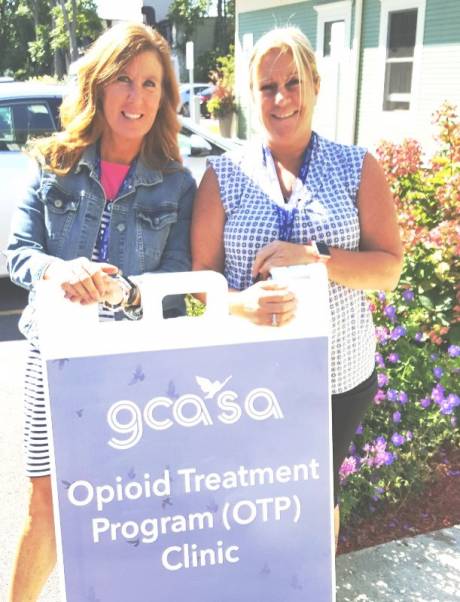Success of methadone therapy at GCASA's OTP clinic 'exceeds expectations'

For the past 13 months, the clinicians at Genesee/Orleans Council on Alcoholism and Substance Abuse have been treating area residents dealing with opioid use disorders at the Opioid Treatment Program facility at the agency’s main campus on East Main Street in Batavia.
The dispensation of liquid methadone at the OTP clinic has had a profound effect on hundreds of men and women in recovery since its Sept. 4, 2018 opening – a positive impact that even GCASA’s senior services director wouldn’t have been able to predict.
“The success of the program has exceeded my expectations,” said Kathy Hodgins, who oversees clinical services in Genesee and Orleans counties. “It has really served people in this area.”
Hodgins credited Assistant Director Jodi Calkins, who supervises a staff of nine (three clinicians, two RNs, three security and transportation personnel, and a secretary) at the office for leading a team that strives to help clients reclaim active and meaningful lives.
Calkins, who was hired by GCASA a year ago after 20 years in the field as a counselor and clinic director, said she and the staff are committed to those in recovery.
“I love my job and I love the patients,” she said. “We work with the whole spectrum – ones who are struggling, ones who are moving forward and those in between.”
She said methadone is given to the patients in liquid form, six days a week, with the dose taken in front of a GCASA professional. She said those who “are compliance in group and individual sessions, and test negative for opioids can earn the privilege” of being able to take home their dosage.
“Patients must submit urine screens to ensure accountability,” she added, noting that the clinic serves about 120 each week but can handle up to 150 or more. “Patients attend group three times a week, meet with counselors one-on-one once a week and also are assigned to a case manager.”
Methadone has been found to be useful at reducing opioid craving and withdrawal and blunting or blocking the effects of illicit opioids. It is offered in liquid, powder and wafer forms and is taken once a day.
Methadone is effective in higher doses, particularly for heroin users, helping them stay in treatment programs longer.
Hodgins said methadone is a “process that sometimes takes them months to get on a stable dose, with careful monitoring throughout.”
She said GCASA has administered suboxone for opioid treatment for quite some time, but it doesn’t work for everyone.
“Methadone is an alternative for people who don’t do well (with suboxone),” she said.
For Steve (name changed), a Genesee County resident in his early thirties, methadone therapy has enabled him to keep a full-time job as an assistant manager and given him renewed hope.
“If it wasn’t for Dr. (Matthew) Fernaays and (counselors) Sarah (Johnson) and Mandy (Moore), I don’t know where I’d be,” he said. “I’d probably be dead.”
Steve said he began methadone treatment about nine months ago, at first coming to the OTP clinic every day but now arriving four days a week.
“I’ve earned take-homes for being clean,” he said, mentioning that he has been sober since Jan. 21, 2019.
He said his downward spiral with opioids started when he was 16 when a doctor prescribed pain pills for a knee injury.
“I got hooked on them and this was before regulation,” he said. “I got up to 380 pills a month and that kept going and going for years. Eventually, the pills weren’t enough anymore and I turned to other drugs.”
Steve said he began suboxone treatment at GCASA about a year ago after he “lost his family.”
“My parents, my sister, my brother … no one would talk to me,” he said. “I had to find something to change my life.”
Unfortunately, he relapsed after being sober for six months, but chose to return to GCASA in a last-ditch effort to maintain his family ties.
He said he understands he may be on methadone for the rest of his life – although he hopes to wean off of it – but, either way, he’s proud of what he is accomplishing.
“I have my family back, I’m working, I have a new car and I’m feeling like a human again,” he exclaimed. “They saved my life – 100 percent.”
GCASA Executive Director John Bennett said stories such as Steve’s make it all worthwhile, and validate the need for extended services in Genesee County.
“We are thankful to the governor and OASAS (NYS Office of Alcoholism and Substance Abuse Services) for investing in our region to assist us in providing a continuum of care for persons living our rural communities,” Bennett said. “We have had great support from our community, from families and civic leaders in the region, which is the key to a program like this being successful.”
Bennett noted that the OTP clinic is nearly at its capacity.
“The persons being served no longer have to travel to Erie or Monroe County to receive services,” he said. “Our staff is comprised of highly trained individuals who focus on welcoming patients into a relaxed, compassionate atmosphere which supports recovery from addiction.”
Methadone is dispensed daily to patients Monday through Saturday from 7-10:30 a.m. GCASA accepts most insurance. For more information about services at GCASA, including the OTP clinic, go to the agency’s website – www.gcasa.net.
Photo at top: Kathy Hodgins, GCASA Senior Services director, left, and Jodi Calkins, assistant director.
Disclosure: Story by Mike Pettinella, GCASA publicist.
